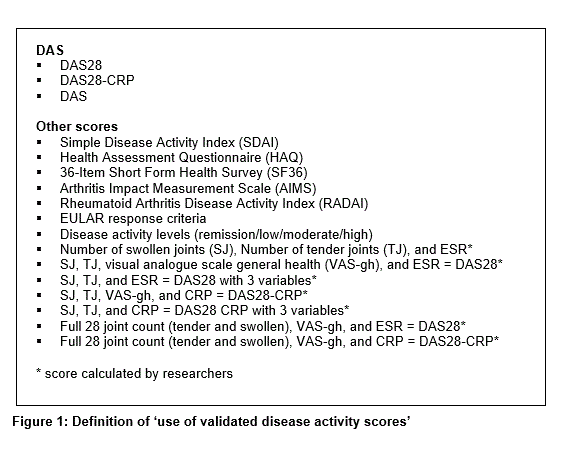Session Information
Session Type: ACR Poster Session B
Session Time: 9:00AM-11:00AM
Background/Purpose:
International guidelines and studies recommend rheumatologists to use validated measures to monitor disease activity, such as the Disease Activity Score of 28 joints (DAS28). However, based on previous research, that recommendation was marginally followed in daily clinical practice. Before the dissemination of the Dutch guideline, it was found that in 16% of the patient’s visits a measure for disease activity was obtained.[1] Up till now it is unknown whether adherence to tight control increased since the dissemination of the Dutch guideline in 2009. This study aims to evaluate whether the use of validated disease activity scores has changed since 2007.Methods:
To increase the precision of the study, Dutch rheumatologists that participated in the study of 2007 were invited to re-enter the study, If necessary, data were supplemented with data from colleagues and ‘new’ rheumatologists. Per rheumatologist, data was collected from the first 30 consecutive patients that visited the outpatient clinic. Per patient, data from four consecutive rheumatologist visits were collected. Data were collected by local nurses or by a research assistant, using case record forms. Disease activity was considered to be measured when either a validated score was reported in patients’ medical chart, or when the researchers could calculate a validated score from the reported data (see figure 1). To allow comparison, this definition is the same as van Hulst et al. used in their 2007 measurement.[1]Results:
At this phase of the study, a medical chart review was performed on a sample of 1044 visits, within 10 rheumatologists, within 7 Dutch rheumatology outpatient clinics. These preliminary results show that in 84.0% (877/1044) of the visits a RA disease activity score was reported. Of those visits, a DAS28 score was reported in 49.6%(435/877) of the cases, a DAS28-CRP score was reported in 13.5% (118/877) of the cases, and a DAS score was reported in 2.6% (23/877) of the cases. In the remaining 34.3% (301/877) of the cases, another disease activity score was used (see figure 1).Conclusion:
Based on the preliminary results, the use of validated disease activity scores has increased since 2007. Currently, a medical chart review on a sample of 35 Dutch rheumatologists is still ongoing. Ultimately, we will present data on their use of validated disease activity scores, as well as on medication regimen changes based on disease activity. References: 1. van Hulst LT, Hulscher ME, van Riel PL. Achieving tight control in rheumatoid arthritis. Rheumatology (Oxford, England). 2011;50(10):1729-31. Acknowledgements: We thank all participating rheumatologist and nurses for their cooperation.
Disclosure: M. J. de Jonge, None; L. W. M. Boerboom, None; A. M. P. Huis, None; J. M. Weijers, None; M. A. F. J. van de Laar, None; M. E. J. L. Hulscher, None; P. L. C. M. van Riel, None.
To cite this abstract in AMA style:
de Jonge MJ, Boerboom LWM, Huis AMP, Weijers JM, van de Laar MAFJ, Hulscher MEJL, van Riel PLCM. Increase in the Use of Validated Disease Activity Scores in Current Daily Clinical Practice Compared to 2007 [abstract]. Arthritis Rheumatol. 2016; 68 (suppl 10). https://acrabstracts.org/abstract/increase-in-the-use-of-validated-disease-activity-scores-in-current-daily-clinical-practice-compared-to-2007/. Accessed .« Back to 2016 ACR/ARHP Annual Meeting
ACR Meeting Abstracts - https://acrabstracts.org/abstract/increase-in-the-use-of-validated-disease-activity-scores-in-current-daily-clinical-practice-compared-to-2007/

